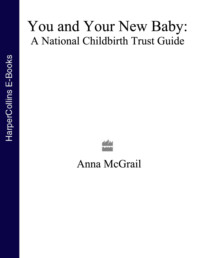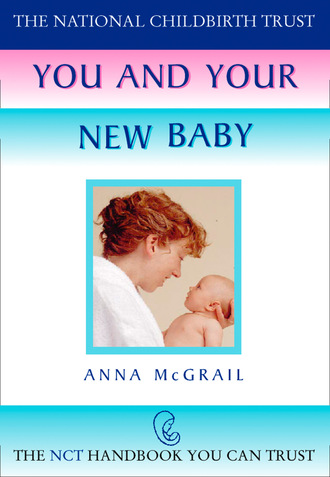
Полная версия
The National Childbirth Trust
The fontanelles: your baby will have two main fontanelles – soft spots on her head where the skull bones haven’t yet grown over and fused together.
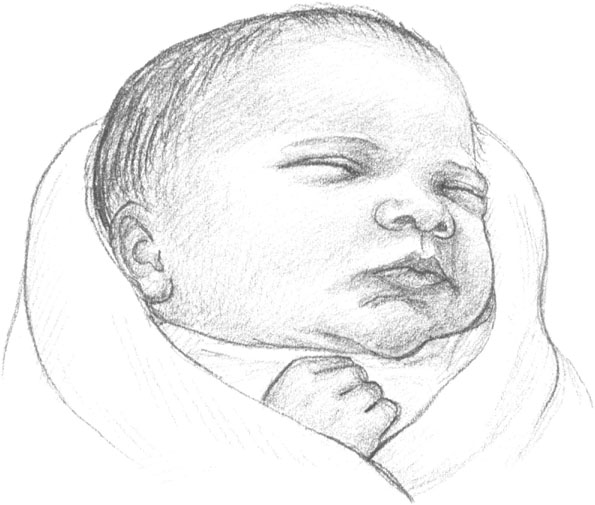
IT’S NORMAL for the fontanelles to appear slightly indented, and you may notice a pulse beating through the skin. You may worry that they are very fragile, but they are covered by toughened membranes. If they do become very sunken or raised, this is a useful warning sign that your baby is unwell, possibly dehydrated and needs medical attention.
All babies, while in the womb, are covered with a fine fuzz of hair called lanugo. Sometimes there will still be a little of this lanugo left when the baby is born – but it will soon rub off.
Some babies may be born with coarse hair, often across the shoulder blades or down the spine, which can alarm parents. Most of this will fall out – it just rubs off.
In fact, the hair your baby is born with on his head may well not last – if you look at new babies a couple of weeks old, you will notice that they have a little bald patch on the back of their heads where the hair has been rubbed away by the mattress. All the hair is gradually replaced, and the colour it will finally be cannot be judged from the colour he started out with – many babies change from fair to dark, and some vice-versa.
A blister on the baby’s upper lip concerns some parents, but it is only a ‘sucking blister’, an indication of your baby’s enthusiasm for feeding. The blister may disappear between feeds, it may not. Babies seem entirely oblivious to the blisters and they soon fade as feeding frequency decreases.
If there’s anything that worries you, ask your midwife or health visitor. They will be visiting you regularly to check things like this. If your baby has a condition which needs further treatment, you will be given further information and often the names and contact numbers of support groups. If in doubt, ask.
VITAMIN K
VITAMIN K has been much in the news the last few years as health authorities and trusts have been rethinking their policies on this issue.
A few years ago, almost every newborn baby in this country was automatically given an injection of vitamin K just after birth with the aim of preventing haemorrhagic disease – a rare but dangerous condition in which the baby’s blood fails to clot in the event of any bleeding. Vitamin K prevents this disease developing and thus the injection programme gained widespread acceptance. No one knows why babies are born with low levels of vitamin K compared to adults, but it may be a safety measure in the womb when cells are dividing very quickly.
Then a study was published which showed a possible link between vitamin K injections and childhood cancer. Although the link was never proven, many health authorities decided to err on the side of caution and replace the routine injection with an oral dose of vitamin K, which was not linked with any problems.
You will find that your baby will be offered a preventive dose of vitamin K shortly after she is born. It is up to you and your partner to decide, well beforehand, whether and how you want her to have this. The disease it prevents is rare, but possibly fatal, and it isn’t possible to predict which babies will develop the disease. Babies who develop bleeding are usually found to have an underlying liver problem. If you want more information before making your decision, discuss it with your midwife.
FIRST ATTEMPTS
THERE ARE many new skills to learn, but all new parents experience this daunting realisation: just how much they have to learn. Rose, like many new mothers, had to start from the beginning: ‘“Have you fed and changed him?” the nurse said to me at six o’clock in the morning, when I’d only had him at ten the night before. And I thought, “What? Me? No.” So I went and looked for the stuff I’d need and I didn’t know where it was, and everyone had just left me. Then this other nurse came round and I was in tears. She said, “Are you alright, love?” I said, “No, I don’t know what I’m doing!” So she showed me. She was really nice. She had two little boys of her own and showed me which bits to wipe and which bits to use where…you know, all that stuff they give you in hospital, all those gauze things…you don’t know which end to use what on. The gauze was for wiping his bottom, apparently and I’d been trying to wash his face with it.’
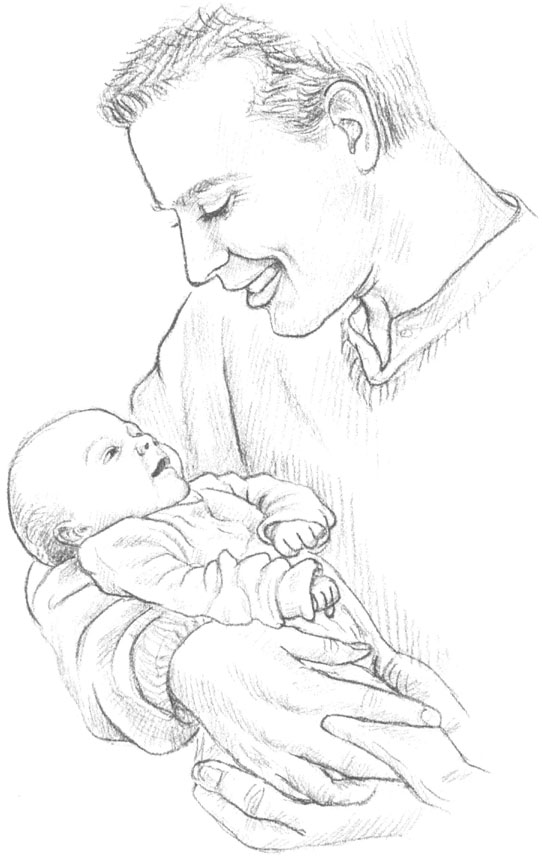
BEING IN hospital can make things very public, as Hilary found: ‘It was awful, that first time. I felt like I was on show, like everyone was watching me. I’m sure they weren’t, they were all too busy with their own nappies, but it was a very testing time. And I felt like Lucy was made out of china. I didn’t want to fasten the nappy too tight, so it fell off, and then I did it too loose and it leaked. Mind you, you get used to it very quickly.’
Sometimes no knowledge can be a good thing, says Chloë: ‘Nobody ever came along and told us what we had to do or should be doing, because once he was born, they just left us on our own for the rest of the day and then we came home that same evening, so nobody was there to guide us. So that evening we thought we’d better change him and it was … I found it very exciting. It was very frightening, too, that first time, because he had meconium and I was worried in case he was suffering, and I kept thinking, “Is this normal?” But the most important thing was the excitement. I felt very excited to have him home and very happy. I wanted it like that.’
John reckons it’s often the simple tasks that worry you most, in the beginning: ‘There were obvious things I didn’t know. Like, I didn’t know what the cream was for. I didn’t realise it was a barrier cream. It’s obvious now but I didn’t realise then, so I put as little of it as possible on and he got very bad nappy rash. So I could have done with a bit more guidance in those early days.’
YOUR BABY’S TEMPERAMENT
ONE THING that will determine how tough or how easy you find the transition to parenthood is your baby’s temperament. Some are easier than others. Some babies actually seem to like being babies, and thus help make their babyhood a more enjoyable experience for all concerned, too; other babies seem to actively dislike being a baby. There are sighs of relief all round when they sit up, or walk, or turn into a toddler, whichever great achievement they seem to have been pining for.
Wakeful
IF YOU HAVE a baby who seems to need very little sleep – lucky you! You have an intelligent, smart child with great potential who will obviously do very well in life. At least that’s what everyone will tell you. And, if it’s any consolation, they’re probably right. Some babies are born wanting more – more of everything: more colour, more shapes, more talk, more walks in the park, more discussions over whether he’d like his bath now or later, or after the news.
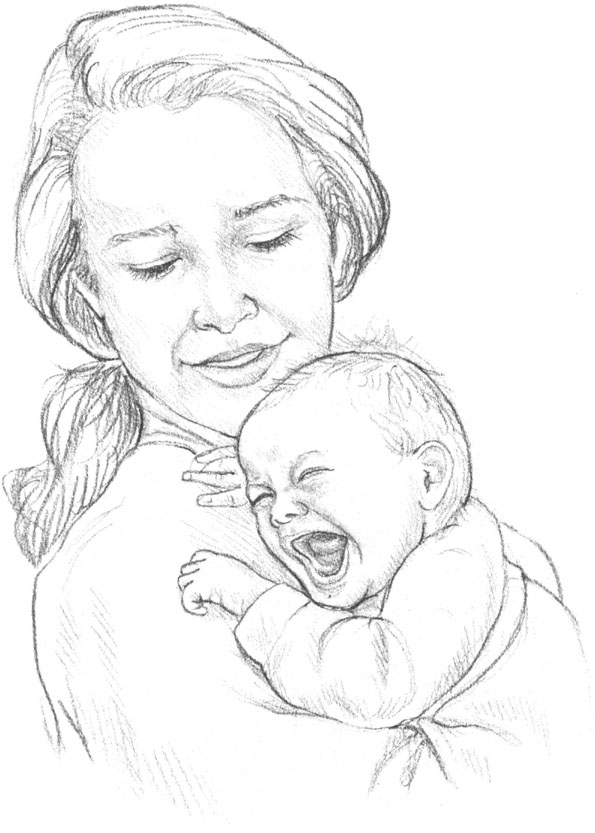
If the wakefulness just lasts during the day, it’s going to mean hard work for you, but parents often find that this sort of baby, hungry for stimulation, is quite happy to be passed from friend to friend and all around the grandparents. Invite round old friends, distant relatives – anyone who’ll dandle the baby on their knee while you get on with calm and relaxing tasks like cooking dinner for 35.
Never underestimate how exhausting a wakeful baby can be. No matter how much you love someone, and no matter how much you love being in their company, it is very wearing to be 100% responsible for all their entertainment, as well as their meals, hygiene and bodily functions.
This is where partners need to be very supportive of each other. Whoever comes home from a hard day at work needs to remember that the person who’s spent all day with the baby is in far more need of a break. They should try not to show too much surprise if greeted at the door by a partner holding the baby at arm’s length.
If your baby’s wakefulness lasts late into the night as well – you have my sympathy. This is an exhausting phase. Everything you do will be coloured by your lack of sleep if you are dealing with sleepless nights. You will feel irritable, cross and desperate. But it is only a phase. For you and the baby. There are only two things which will cure your exhaustion:
Time – all children sleep through the night eventually
Sleep – can you have a nap when the baby does? Why not? Whatever needs doing, can’t it be put off? Your rest and your health come first.
Sad
SOME BABIES spend a lot of time crying. There’s no denying it. And there’s no denying that for much of the time in those very early days, we won’t be able to work out exactly why they are crying.
Rose never discovered what upset her son as a baby: ‘One of the most useful things anyone ever said to me, in Sainsbury’s, when Thomas had grizzled for days non-stop was, “He’s one of those that just doesn’t like being a baby. He’ll be different as a child.” That really kept me going, because, as he grew, I began to see that it was true.’
Cross
AFTER WAITING for so long to meet your baby, and being overjoyed at his arrival, it can come as something of a disappointment to find that your baby seems less than enthusiastic about the world. Some babies seem to find it very hard to come to terms with the stresses and strains of babyhood: hunger, tiredness, the need to meet strangers – think how cross all these things can make you, and you get some idea of how your baby might be feeling.
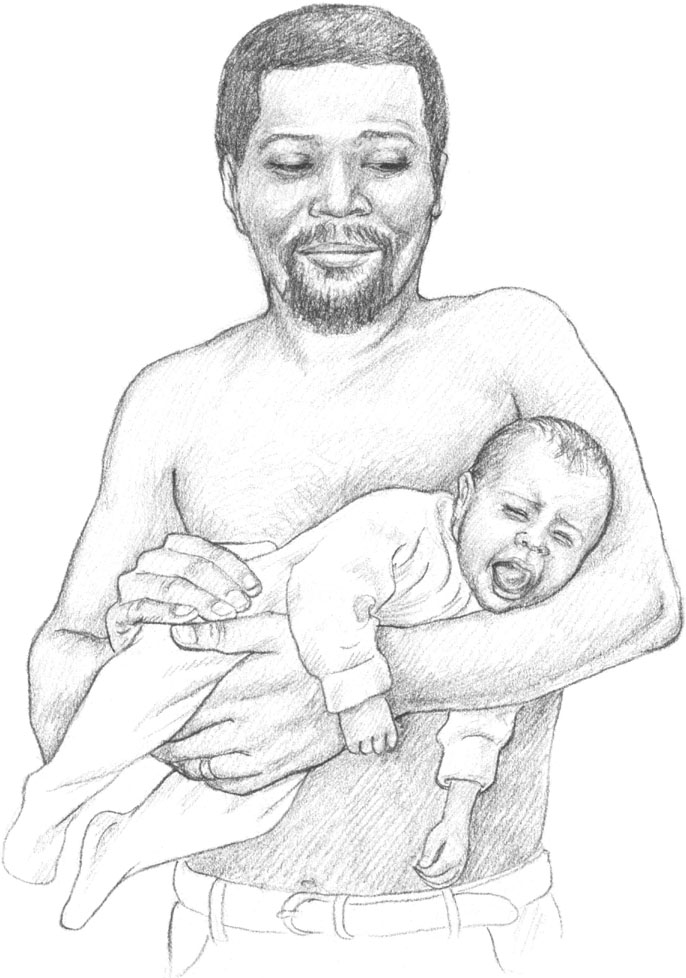
Louise’s son would scream and scream for hours at a time: ‘Nothing would calm him, nothing. No tears. Just this red face and so much anger.’
CRYING IS at its worst in the first year of life, and at its very worst in the first three months. Unfortunately, this is just the time when you are most unsure of your skills as a new parent, and the crying can sound like an unfair judgement on your ability to care for your child.
Chloë comments: ‘I used to think that I must be the world’s worst mother. He was only three weeks old and already I’d somehow got it monumentally wrong. Other women from my antenatal group had babies who’d taken regular naps practically since birth and it seemed like it was just me. It made me feel lonelier than ever when we were awake in the dark.’
IT DOES HELP if you don’t compare your baby to other people s. How can there be any comparison between, say, a breastfed baby who weighed 61b 7oz at birth, and a baby who is given a bottle every four hours and who weighed 121b at birth? How can, in fact, there be any comparison between your own highly-gifted offspring and any other baby in the universe?
CRYING CHECKLIST
If it makes you feel better, you can prepare a list of possible reasons for your baby’s crying:
Hunger
Wet nappy
Temperature – too hot or too cold?
Wind.
And it will probably make you feel better if you have a list of things to do:
Feed the baby (and yourself if necessary)
Change the nappy
Add – or remove – a blanket
Walk up and down.
You’ll find yourself pacing up and down anyway…
It is always worth trying a feed if your baby is very unhappy, especially if your baby is breastfed: breast milk is so perfectly absorbed into the body and so quickly digested that your baby may need to be fed quite often. This is also true if your baby is very tiny; his stomach capacity may mean that he had all he could hold at the last feed but he now needs a bit more. If you can, it’s worth spending some time just cuddling your baby and letting him feed whenever he wants to so that you build up your milk supply. This can also double as a time for you to replenish your reserves of energy: crying is tiring and miserable for the baby, but to listen to it can be just as tiring and unhappy for the parents.
Clingy
FOR MANY babies who cry, the answer will simply be that he wants to be held, especially in these very early days. Some babies have a very strong, instinctive desire to be held and soothed. If you have one of these, then you have the sort of baby who’s fine and happy while you are holding her, pacing the bedroom, or patting her soothingly on her back, but who starts wailing the instant you put her back in her cot. A surprisingly large proportion of these babies, with practice, develop a magic ability to know when you are moving towards the cot and start wailing in protest before you get there. A few – and this is a theory largely maintained by fathers deranged from pacing the bedroom floor once too often – after a quiet period in which they’ve lulled you into a false sense of security, know when you are just thinking that perhaps you might just move towards the cot again and instantly start howling, before you’ve so much as actually lifted a hopeful foot in that direction.
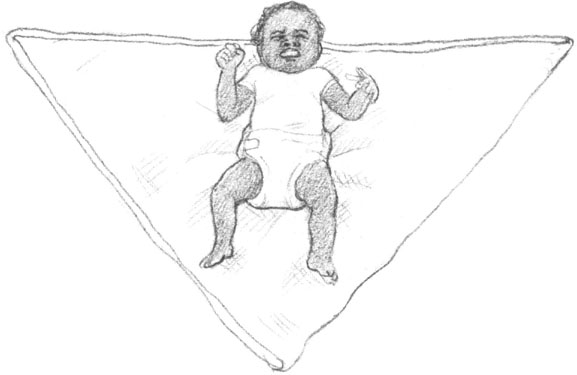
Place your baby on a folded blanket.
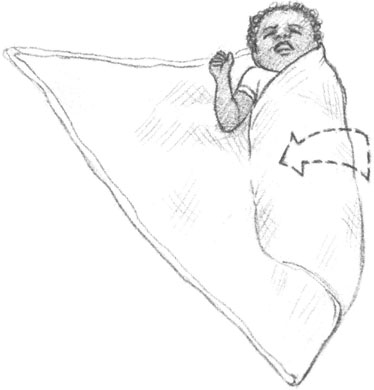
Tuck one side under him…
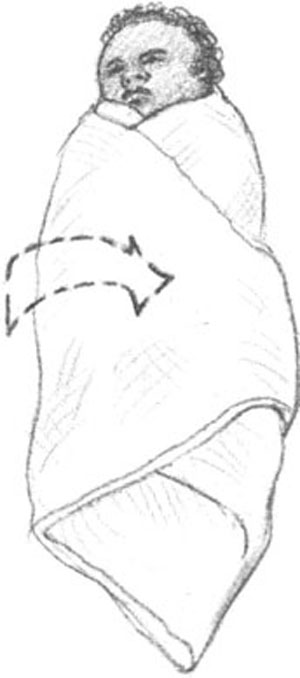
The next side over him…
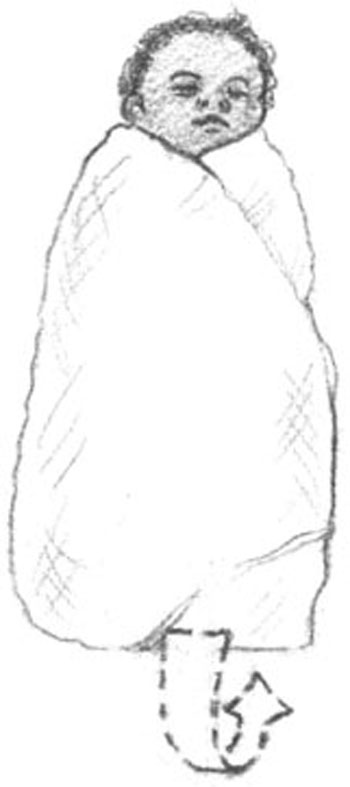
And neaten the end…
You can try:
Swaddling – see right and above, or ask your midwife or health visitor to show you how
Doing shifts: taking it in turns to hold her.
Emerging patterns
BY ABOUT three months of age, the causes of your baby’s crying will have become much clearer: you will also have got to know her patterns and can predict or anticipate what she needs. Olivia found this made motherhood easier and more rewarding: ‘I can usually tell what’s the matter with her, yes. It surprised Robert the first couple of times I did it. I was having a bath and he was walking up and down with her because she was crying and all he could say was: “What is it?” I said, “Has she got a dirty nappy?” And of course he was most peeved to find out that she had. Now I can say, “She’s hungry”, or “She’s bored”. But the best one to learn to understand was, “She’s tired”. If Robert’s with her and she makes that cry, I can say, “She’s tired, she just wants to go to sleep. Stop playing with her, stop trying to keep her amused”. It had often happened, I realised, that we’d been waving toys in her face and all she wanted to do was to go to sleep.’
SWADDLING
Swaddling with a cotton sheet is a tried-and-tested method for calming and soothing newborns. Anyone who has watched a newborn can see the sense in it – those flailing arms and legs can’t be very conducive to sleep. It stands to reason that a baby who has been used to being warmly cushioned in the warm waters of the womb may find the sudden change to fresh air and unlimited space rather frightening. Swaddling can give a sense of security, and enables you to rock your newborn or hold him close to you gently and firmly – which babies like. The only word of warning concerns overheating, which can happen quite quickly to some babies if they are overwrapped. So swaddle your baby to sleep, but don’t overload him with blankets as well.
THE GROWTH OF LOVE
IF YOU’VE GOT a baby who’s behaving in a way you find hard to cope with – whether because she sleeps all the time, is awake all the time, is cross or clingy, you may find it very hard to love your baby. And, if you feel that way, you probably feel guilty, too. Guilt is an unpleasant, gnawing feeling, so, if you feel guilty, you probably resent the baby for having made you feel that way. And you love her less.
RELATING TO YOUR BABY
If you’re finding it hard to relate to your baby:
Give it time … some relationships are slower than others, that’s all
Remember that you cannot ‘spoil’ a new baby. If it’s fear of indulging her that’s holding you back, give in. Allow yourself to cuddle and kiss her as much as you want
Share your worries with your partner, a friend or a relative. Talk it through as much as you can
The birth of your baby may have stirred up unpleasant memories or worries about your own childhood. If this is the case, it is worth telling your GP that you’d like to talk to someone about this
Trust your own instincts – if you feel there’s something wrong with your baby or you, keep asking for professional help until you get it.
Such vicious emotional cycles are sometimes easy to get into in the first few weeks of a baby’s life and hard to break out of again. The best thing to do if you’re beginning to feel like this is to tell someone about it: your midwife, your GP, your health visitor, a friend, your mum … Getting your feelings out into the open is often the first positive step we can take in admitting how we feel and then dealing with it, as Ingrid discovered for herself: ‘I could have gone on pretending everything was alright. After all, the house was immaculate, Rosie was obviously well cared for, and I had this smile plastered on my face every time the doorbell rang and someone came visiting. I think I was worried that no one would believe me if I said I felt there was something wrong. But in the end all I had to do was mention to my GP that I wasn’t feeling right and he said, “Oh, we’ll send one of the community nurses round to have a chat with you.” And she was round the next day. And said she’d come back in a couple of days. Just knowing that someone was going to come, who was interested in me, interested in how I was feeling, and wasn’t just going to ask questions about the baby all the time, made all the difference. I knew I’d get time to talk about me, and that’s what I needed.’
IT CAN TAKE time for love to grow between you and your baby, just as it takes time for love to grow between any two people. Once you realise that this is not unusual, you may be half-way to feeling better.
WHEN THINGS AREN’T AS YOU EXPECTED
Special care
IF YOUR BABY arrives early, or is poorly just after the delivery, you may find that much of the responsibility for day-to-day care is taken out of your hands, especially if she needs to be looked after in the Special Care Baby Unit (SCBU).
If your baby is in an incubator, it can be a very scary experience. Kay found it hard to relate to her premature baby at first: ‘I gave birth under anaesthetic on the Monday afternoon at 2.34pm when he was at 32 weeks’ gestation, and he was taken straight off to the SCBU. A few hours later, when I was coming round, the nurses gave me a Polaroid of him. I thought, “Oh, well, they’re looking after him there much better than I ever could here.” And I wanted to go back to sleep. My throat was very sore – they say that sometimes happens after a general anaesthetic – and all I could think about was having drinks of cool water to try to stop it burning. The rest of the time, I was very fuzzy. By Tuesday lunchtime, the catheter had been removed and, with the aid of the wonderful suppositories that they used for pain relief, I was able to shuffle down, very slow and careful, to see him. He looked very odd, all old and just-born at the same time, very cross and very winkled and slightly bluey-pink. After three days, they put some clothes on him. At one-week-old he moved into a cot with a lid. Then they started talking about when I could take him home and I started to panic. I still didn’t feel like he was my baby, and we still didn’t have a name for him.’
Susanne wasn’t sure throughout her pregnancy how well her baby would be: ‘Perhaps because there had been bleeding in the pregnancy, I had kept my emotional distance from this baby. I wasn’t going to believe the trouble was over till it was over. Even when she was born, I still found it hard to let myself get close to her. She was being looked after by so many different people and they all seemed to know much better than I did how she was doing from day to day.’
Your baby may need to go into special care if she is:
Premature – usually if she has arrived before 34 weeks
Small – weighing under 41b
Having breathing difficulties or has other medical problems.
IT MAY BE impossible at first for medical staff to answer questions on quite what is the matter with your baby if he’s been whisked off to the SCBU. All they may be able to say is that he’s not breathing well, or had the umbilical cord around his neck, but they’ll let you know – trust them. Whether your baby is admitted to the SCBU for treatment or simply for observation, you will be kept informed of progress and developments every step of the way.
It can be very comforting, if your baby is taken to the SCBU immediately after delivery, for your birth partner to go up to the Unit to see your baby settled and report back to you in detail. You will be able to visit as soon as your own physical care has been sorted out.
Kangaroo care for premature babies
THE REASON THAT premature babies are looked after in incubators is that early babies are often unable to maintain a steady body temperature. An incubator provides an environment where the temperature can be kept stable easily. Now, a new method of caring, called kangaroo care, is being tried out by some neonatal units.
Babies are placed in skin-to-skin contact with their mother, against their mother’s chest, and covered with a blanket. The baby is thus close to her parent, and the mother, it has been found, is so in tune with her infant that her own skin temperature rises and falls to keep the baby’s stable. Another advantage of this form of care is that breastfeeding is easier and it encourages more women to breastfeed successfully. So, if your baby needs special care, perhaps it is worth asking the staff if anyone with an interest in kangaroo care would be willing to let you have a go. While it isn’t something that everyone will want to try, as some mothers feel much happier if their infant remains in the care of technology, for some mothers – and indeed fathers – it will be a golden opportunity to get closer to their baby sooner than they could otherwise have hoped for.
Special babies
SOMETIMES, either immediately at the birth, or in the first few days after the birth, some parents are faced with the devastating news that their child isn’t the 100% healthy being they had hoped for. There may be an illness, a disability or a learning disorder, something that won’t just disappear in a few days.
Bridget’s daughter, Lois, had a cleft lip and palate: ‘It sounds awful, but I didn’t even know what this was. I’d never seen it before. John hadn’t, either, so we thought it was something dreadful, and that she’d never be normal.’
PART OF THE insidious nature of many genetically transmitted diseases, like cystic fibrosis (CF), is that one or both parents can be a carrier of the disease and not know it. It can pass undetected from generation to generation, and only when two carriers of the defective gene have a child does the disease come to light. Vicky’s son, Anthony, was diagnosed at birth: ‘I was lucky in a way because Anthony was born with a bowel blockage, which is one of the indications of CF, so he was diagnosed early. We knew what we were dealing with right from the start.’


